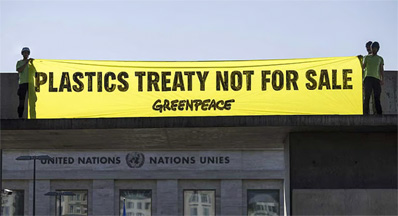Switzerland (TIP): At least 19 fossil fuel and chemical industry lobbyists have secured places in national delegations at the final round of global plastics treaty negotiations in Geneva, triggering outrage from civil society groups and raising serious concerns over the integrity of the talks. The revelation is part of a broader analysis by the Center for International Environmental Law (CIEL), which identified a total of 234 fossil fuel and chemical lobbyists registered to participate in the fifth and final scheduled session of the Intergovernmental Negotiating Committee (INC-5.2). This is the highest industry presence recorded in the treaty process to date — and more than the entire delegation of the European Union and its 27 member states combined (233). The 19 lobbyists have been formally included in the delegations of Egypt (6), Kazakhstan (4), China (3), Iran (3), Chile (2), and the Dominican Republic (1). Their inclusion gives them access to closed-door discussions and potentially even a voice in defining national positions on the treaty —a situation civil society groups say amounts to a direct conflict of interest.
“The industry is not just observing — it is actively shaping the outcome,” said Rachel Radvany, CIEL’s Environmental Health Campaigner. “We’ve seen them speak in plenary, push their agenda publicly, and align with petrostate interests to weaken ambition.”
The Plastics Treaty is intended to address plastic pollution across its full life cycle — from production to disposal — and many countries, scientists, and communities are pushing for binding caps on production and use of toxic additives. But with lobbyists embedded inside negotiating delegations, critics argue the process is at risk of being co-opted from within.
When this reporter asked whether it should not be the responsibility of the United Nations Environment Programme (UNEP) to prevent industry representatives from entering national delegations, David Azoulay, Director of Environmental Health at CIEL, responded by pointing out a critical gap in global environmental governance.
“The INCs are following rules established for earlier agreements, where it’s up to Member States to define the makeup of their delegations. But UNEP could still play a more proactive role. They could encourage greater transparency and better conflict of interest policies — even if they can’t directly control who gets in.”
Azoulay contrasted UNEP’s approach with that of other UN bodies that have adopted firm safeguards. “UNDP and WHO both have clear conflict of interest policies. UNEP does not. The WHO’s Framework Convention on Tobacco Control even bars tobacco industry representatives from participating in treaty implementation or attending decision-making meetings. It shows that if the political will exists, it is absolutely possible to prevent undue influence.”
Meanwhile, civil society organisations face barriers not just in influence, but in physical access. “UNEP has drastically reduced the number of contact group seats from over 200 to just 60,” Bjorn Beeler, Executive Director of the International Pollutants Elimination Network (IPEN) told this newspaper. (AP)

Leave a Reply